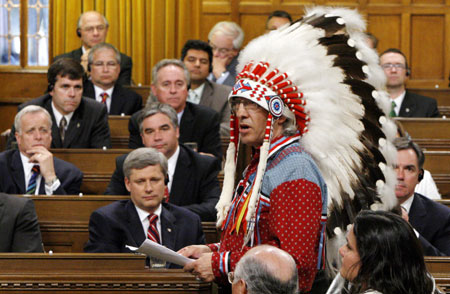"The government of Canada now recognizes it was wrong to forcibly remove children from their homes...," Harper continued. "We apologize for having done this."

Canada's Prime Minister Stephen Harper (bottom L) and other MP's listen as National Chief of the Assembly of First Nations Phil Fontaine (R) speaks in the House of Commons on Parliament Hill in Ottawa June 11, 2008. (Xinhua/Reuters Photo)
From the 1870s to the 1970s, about 150,000 aboriginal children were forcibly removed from their parents and sent to residential schools in a bid to assimilate them into Christian society. Many say they were subject to mental, physical and sexual abuse at the schools, where they were forced to live under dire conditions.
Although long overdue, Wednesday's apology was a momentous occasion for the victims and all aboriginals to close the dark chapter in their lives and start on a new path of healing.
"It's a long outstanding issue that is finally here. It's well over 100 years that they have done wrong to First Nations people, Inuit people and the Metis people. We have been expecting Canada to recognize what was done wrong and accept total responsibility for it," said Ted Quewezance, executive director of the National Residential Schools Survivors' Society.
Both aboriginal leaders and Canada's politicians also see this as an important opportunity for the nation to come to terms with its past and set the stage for reconciliation and understanding among aboriginal and other Canadians.
"What happened today signifies a new dawn in the relationship between us and the rest of Canada... We are all part of one garment of destiny. The ties that bind us are deeper than those that separate us. We still have to struggle, but now we are in this together," said Phil Fontaine, chief of the Assembly of First Nations, in response to Harper's apology.
"Today's apology is about a past that should have been completely different. But it must also be about the future. It must be about collective reconciliation and fundamental change," said Liberal Party leader Stephane Dion.
"It must be about moving forward together, aboriginal and non-aboriginal, into a future based on respect. It is about trying to find in each of us some of the immense courage that we see in the eyes of those who have survived.
(Xinhua News Agency June 13, 2008)